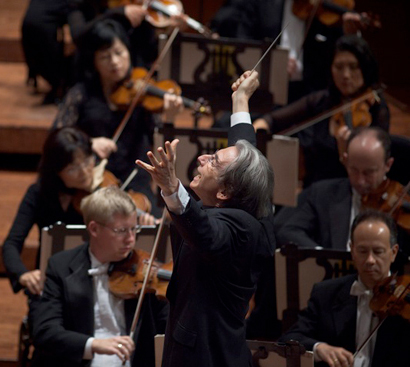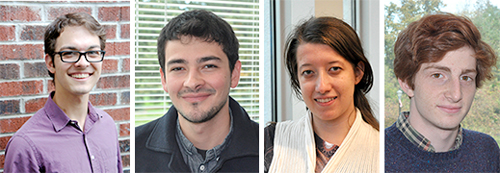
Each morning, the Rubin Institute Fellows will submit reviews of the previous evening’s concert to be critiqued in private workshops and public sessions by the Writers Panel, which includes noted American critics Anne Midgette, Tim Page, John Rockwell, Alex Ross, Heidi Waleson and Stephen Rubin (president and publisher of Henry Holt & Co., a frequent feature writer for The New York Times who founded and is principal funder of the Institute).
Oberlin’s team of writers includes Daniel Hautzinger, Jarrett Hoffman, Zoë Madonna and Aaron Wolff, all of whom have taken Oberlin’s Introduction to Music Criticism course, team-taught by Donald Rosenberg, Mike Telin and Daniel Hathaway. (Read the bios of all the student writers here.)
Mike Telin, who is accompanying the Oberlin team, will report daily from the Institute. Here are his dispatches from the front lines.
San Francisco — Thursday, November 6
by Mike Telin
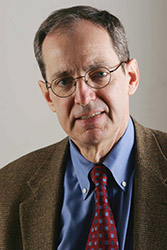
Tommasini began answering the question by eloquently recounting the important role that the late American composer and critic Virgil Thomson played as a mentor to him early in his career. Tommasini said he would often send pieces of his that had been published for Thomson’s comments. To his surprise, Thomson never commented on Tommasini’s opinions about a performance, but rather advised him to persuade his readers why he felt that way. Interestingly, this is the same advice we give to our own students.
Tommasini asked what we have learned from the demise of New York City Opera, and The Metropolitan Opera’s production of The Death of Klinghoffer. After making some thoughtful comments about both issues, he wondered if anything he had written could have changed the outcomes? Probably not, he said. With regard to City Opera he pointed out that organizations must be able to articulate a clear mission, however mission and vision are not enough. They must have a great business plan as well. With regard to Klinghoffer, he said that he feels The Met missed an opportunity to engage the public in an important discussion: “What is art for if not to explore the grievances of people?”
He also poignantly spoke about the conservative nature of classical music, especially compared to other art forms. However he does think that young people today are open to everything. By the time he had finished discussing the fast-paced changes that are occurring in the field of journalism, I once again found myself wondering: with everything changing or falling apart or re-inventing itself, what is the purpose of the Rubin Institute? Why should music criticism be taught?
The defining moment of the address came during the question and answer period when a student from Yale asked: “So, why are we here?” Although I’m certain this question might have sent shivers down some people’s spines, Tommasini didn’t bat an eye. He quickly pointed out that more is being written today about classical music than ever before — thanks to on-line journals and bloggers. And does he think that arts organizations actually care about what the smaller publications have to say? His answer was, a resounding – “Yes they do!”
I think it’s a good thing to continually ask yourself why you are doing something. If any of the Rubin Fellows are wondering why they are about to put themselves through the grueling task of writing four overnight reviews, maybe they won’t leave the Institute knowing exactly why. Perhaps they won’t know until they are running their own successful businesses or serving in a leadership capacity. What helped them achieve success? The ability to think and write critically. During the next four days classical music will serve as the vehicle for honing those skills.
Friday, November 7
Hello to all from a sunny and warm San Francisco. The first full day of the Institute went quite well. Although everyone was a little sleep deprived after an early Wednesday morning flight to Phoenix (we needed to be at the airport at 6:00 am) and from there on to San Francisco, the weather was been helpful in bringing everyone back to life. David Stull and his team of organizers have really outdone themselves. Their attention to detail has been amazing.
Although yesterday’s post addressed the academic side of the Institute, that’s only one part of Wednesday’s story. Following the Keynote address everyone was shuttled to the magnificent Getty mansion for a welcome dinner hosted by Ann and Gordon Getty. The view looking out over the bay and the bridge is spectacular! The hour-long cocktail reception gave all the fellows, staff and invited guests the opportunity to meet each other. And the mansion provided plenty of conversation starters. We then moved into the dinning room for dinner, and hats off to the people who did the seating. Dinner was delicious, but the wine from one of the Getty wineries was superb. As important as the academic side of the Institute is, I strongly believe that developing social skills – the ability to make creative small talk without spilling your drink and dropping bits of hors d’oeuvre on your shoes —or even worse, on someone else’s shoes — is equally important. Luckily there were no faux pas and everybody enjoyed it immensely.
On Thursday night we attended a San Francisco Symphony concert conducted by Michal Tilson Thomas. It was absolutely great. The program, Liszt’s Mephisto Waltz No. 1, Mozart’s fifth violin concerto with Gil Shaham and Ravel’s Daphnis et Chloe, is the same one Thomas and the orchestra are bringing to Severance Hall in Cleveland on November 15. I’ll be eager to hear this repertoire again — only this time in the more gratifying acoustics of Severance Hall.
The Fellows’s 400-word reviews of the concert were due at 7:30 Friday morning. They have been in sessions with the visiting critics since 9:30. I’m very interested to hear how things went.
Tonight we’re off to a concert by Philharmonia Baroque conducted by Julian Wachner. I’m looking forward to hearing the orchestra live for the first time. I also haven’t seen Wachner conduct in a few years. It should be fun.
Saturday, November 8
Good morning. It seems that all of the Fellows survived the task of submitting their first overnight reviews of the Institute, although a few of the Fellows were up until the wee hours. (Their reviews of Thursday evening’s San Francisco Symphony concert were due Friday at 7:30 am.) Most importantly the 17 Rubin Fellows thoroughly enjoyed workshopping their reviews with the Writers Panel for three hours Friday morning and for two more hours in the afternoon. (The Fellows are divided into small groups which then rotate among the panel members.) On a personal note, when I ran into the Oberlin students following the five hours of sessions and asked how everything had gone, they were very enthusiastic about the day. They pointed out that the process of critiquing their reviews was the same as we use in the class. But it was fun to hear the same points articulated in different ways by each of the panel members.
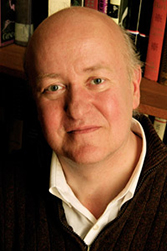
Each of the panel members relayed their own stories of how they ended up becoming classical music critics. Tim Page is the only one who seems to have entertained the idea early in his life. The rest never imagined themselves becoming critics. They all “fell into” the job.
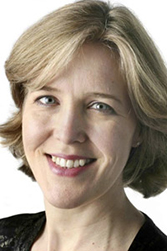
I could not agree more with Midgette. It is the 17 young, talented Fellows who will play a role in steering the future of classical music and journalism, and the Institute is providing them with those tools.
Prior to attending an outstanding concert by Philharmonia Baroque, we all gathered for a great Italian dinner served family-style. As I looked across the restaurant and saw the Fellows, the panel members and the Institute staff engrossed in conversation with each other, I was overcome with a feeling of optimism about the future of classical music and journalism. As a colleague from Chicago said to me from across the table, “The young people will figure it out.”
Sunday, November 9
Three Down and One to go.
It’s a beautiful Sunday afternoon in Berkeley, California. The final public pane of the Institute concluded an hour ago and the Fellows are currently in their final group sessions. At 3:00 pm everyone will attend a concert by the Czech Philharmonic and Prague Philharmonic Choir presented by Cal Performances. Jiří Bĕlohlávek will conduct Dvořák’s Stabat Mater. The Fellows’ final reviews are due by 9:00 tonight and tomorrow morning the prizes will be awarded. Perhaps it goes without saying, but I believe a big party is being planned for later tonight.
On the bus ride from San Francisco to Berkeley, I had a chance to talk to the Oberlin Fellows and get their thoughts on the Institute.
Has the experience been what you had expected it would be?
Daniel Hautzinger: No. I came here intimidated by the fantastic writers who are serving on the Critics Panel. But being in a room with them every day, I found that they really are as interested in us as we are in them.
Jarrett Hoffman: No, I knew that I wouldn’t be getting a lot of sleep, but I am surprised how much emphasis there has been on group activities like receptions. I thought I would be spending a lot more time by myself, so having all of the group activities has been a pleasant surprise.
Zoe Madonna: No, I didn’t think it would be this glamorous. We have been treated so well, especially at all the social events.
Aaron Wolff: Yes and no. I’m not sure exactly what I expected, but I have really enjoyed all of the discussions about the future of classical music and journalism.
Do you think you will be returning to Oberlin a better writer?
Hautzinger: Oh yes. Having to do it every day with the added pressure of having all of these great writers, both critics and the Fellows, has really inspired me. It has been great to be able to read reviews written in so many different styles.
Jarrett Hoffman: I am definitely a better writer, especially in terms of creating a dialogue with the world about music. And being around all of these great writers – both the panelists and the Fellows — is fantastic. We’re all learning from each other.
Zoe Madonna: I have definitely become a better writer because of this experience. It’s been a pressure-cooker, but I expected that.
Aaron Wolff: Yes. You become a better writer through repetition. And being forced to write an overnight review is great practice. Reading the reviews of the other Fellows both challenges and inspires me.
Are you having a good time?
Daniel Hautzinger: Yes! This is my ideal world, sitting around talking about music with intelligent people who are listening to what I have to say and responding to that, rather than only talking about what they think.
Jarrett Hoffman: I’m having a great time in spite of being incredibly sleep deprived.
Zoe Madonna: I’m having an excellent time. I’m really enjoying hanging out with everyone, not only from Oberlin, but from all of the schools.
Aaron Wolff: I’m having a great time, but it’s been tough. It’s a lot of fun because I find that writing criticism helps to define who I am as a musician.
Earlier this week I had the chance to have coffee with Lakewood native David Conte, composer and chair of the composition department at the San Francisco Conservatory of Music. Conte’s first year master’s student Brian Fitzsousa, is a Rubin Fellow. I asked David Conte why he thinks it’s important for his student to study music criticism?
“Today, musicians are more than ever called upon to take an educator’s role with their audiences when they play concerts, or as composers when they present their music. The study of music criticism prepares them to do this in a unique way. There is also great value in studying the expert criticism of the past, in particular writers like Virgil Thomson, and tangentially for musicians, also the film critic Pauline Kael.”



